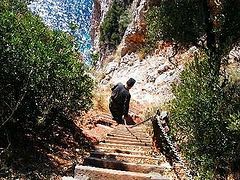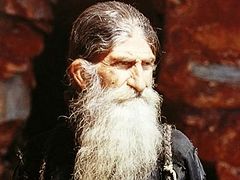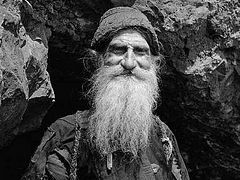 Elder Dionisie (Ignat) It was in 1996. I came to Mt. Athos for the first time. A beardless student who didn’t know a thing about theology, I set about walking around the holy mountain from monastery to monastery. For those who have never been to Mt. Athos: there are great distances between cenobiums there, so you have to walk dozens of miles through deep dust, sometimes knee-high, with the temperatures reaching around forty degrees Celsius. I had no money to go by a minibus, which was driven by a disagreeable Greek monk who wouldn’t have taken me without a ticket even if he had had plenty of empty seats.
Elder Dionisie (Ignat) It was in 1996. I came to Mt. Athos for the first time. A beardless student who didn’t know a thing about theology, I set about walking around the holy mountain from monastery to monastery. For those who have never been to Mt. Athos: there are great distances between cenobiums there, so you have to walk dozens of miles through deep dust, sometimes knee-high, with the temperatures reaching around forty degrees Celsius. I had no money to go by a minibus, which was driven by a disagreeable Greek monk who wouldn’t have taken me without a ticket even if he had had plenty of empty seats.
I would stay for three or four days at each monastery, standing through night services, laboring, looking for music manuscripts, studying them, and so on.
Let me tell you how my meeting with Elder Dionisie from the Colciu Kellia [the name for a small skete on Mt. Athos.—Trans.] took place. Previously I had known nothing about him or his paradisiacal kellia nestling on the edge of the precipice. I was on my way from Xeropotamou to Vatopedi—the most beautiful monastery on Mt. Athos. Suddenly I saw a decrepit wooden sign, reading “Kolitsou”, meaning “the Colciu Kellia“ in Greek. It was two in the afternoon. Tired to the bone, I hadn’t had a crumb since the previous evening, so I decided to head there. I thought: “It seems some Greek monk lives there. Perhaps he’ll give me a hunk of bread with a tomato.”
After fifteen more minutes of walking I found myself in a clearing which was as beautiful as Paradise. The gentle sun was shining through the foliage. A little elder was sitting on a bench. I said, “Kalispera”, which means “Good afternoon”, and sad down on the other end of the bench. I put my arms around my head, getting my breath back. Suddenly I heard the following in Romanian:
“Hey, Ioan, come closer!”
I almost fell from the bench, thinking: “This elder is Romanian and he is calling Ioan!” Then the little elder repeated:
“Ioan!”
I was dumbfounded:
“Are you addressing me?”
The elder replied:
“Do you see any other Ioan here?”
Tears gushed from my eyes. The blind elder knew my name! I sat down next to him, and Fr. Dionisie took my hand in his and began to speak. Nobody had ever known so much about me! About my father and grandfather who were priests, about my innermost thoughts and sorrows that didn’t give me a moment’s peace.
We talked all day long till one in the morning. The monks would come up to us:
“The father is old and sick. He needs rest.”
But Fr. Dionisie was holding my hand tight:
“No, I need to say something more to him.”
I spent four days in the kellia which seemed to have come down from heaven. The monks celebrated barefoot on the uncovered earthen floor of their tiny church.
Most of what I heard from him about the antichrist, the end of the world and other things must be kept secret, and I have no blessing to reveal this.
The next year I travelled to Mt. Athos again. I was impatient to see my dear Fr. Dionisie, with whom we had spent so much time together. I was filled with joy…, and pride at the same time.
 The Colciu Kellia of Great Martyr George the Victorious
The Colciu Kellia of Great Martyr George the Victorious
When I reached the same clearing, it was the afternoon and my dear elder was sitting on the edge of the bench just like the previous time. I approached him quietly. His fingers were running through a prayer rope, his mouth whispering silent prayer. I dared not bother him. At last I made up my mind:
“Father, it’s me.”
“Who ‘me’?” the elder said.
“Ioan, a student.”
“I don’t know any student named Ioan.”
It felt like I had been plunged into an abyss. How could it be?! A year earlier he had known everything about me without hearing anything about me; but now he was saying he didn’t know me. I burst into sobs:
“But father, you called me by my name last year, though you had never seen me before!”
Some minutes later the elder answered in a sad voice:
“We are silly: we neither know theology in depth nor take pride in our brilliant intellects. We are silly peasants who have hid here seeking salvation.”
And suddenly I had a brain storm: out of love the elder reproached me for my pride in this way. His words cut through the darkness of my false ideas and illusions, the vacuity of my self-conceit from the flesh of my soul. Like a skilled surgeon, the elder without anesthesia “cut off” and “removed” the “cancer” of my pride.
I wept for around ten minutes. The blind elder stood up from the bench and came up to me. He groped a little at the empty air with his hand and touched my tear-stained cheek:
“Come on, Ioan! You are the one who knows most and does least.”
And a tear rolled out of the elder’s gorgeously blue blind eyes.




